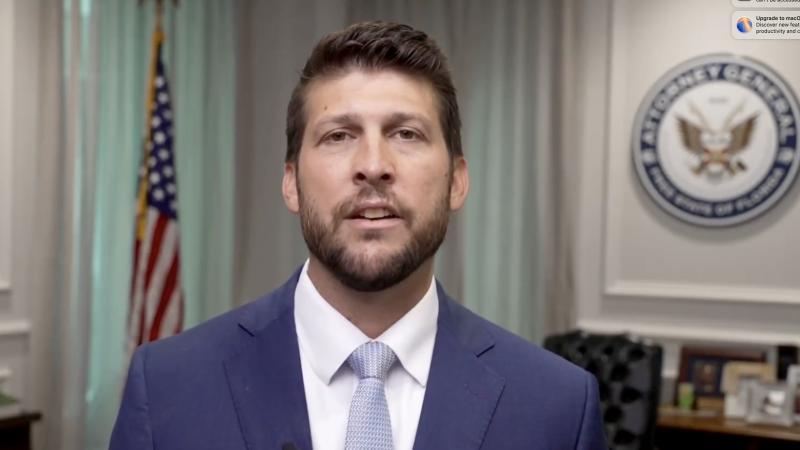Georgia Gov. Kemp, allies shield details of major Rivian deal from public view ahead of GOP primary
Critics accuse officials of keeping citizens out of the loop, using underhanded, backroom dealings.
Just over one week before Georgia's Republican gubernatorial primary, incumbent Gov. Brian Kemp and his allies backing a massive new economic development project in the Peach State are concealing key details of the agreement from the public, with critics alleging the use of underhanded tactics and shady backroom deals to push it through despite local opposition.
State and local officials in Georgia earlier this month announced a deal to dole out $1.5 billion of incentives to electric vehicle startup Rivian for it to build a $5 billion manufacturing plant east of Atlanta that will create 7,500 jobs.
The incentive package, by far the largest Georgia has ever offered to a company, includes major tax credits, a 25-year no-cost lease, and more than $198 million in site and road improvements on the 1,978 acres where the plant will be built in Morgan and Walton counties.
The deal to construct Rivian's new electric vehicle manufacturing hub was first announced in December. Since then, Kemp has touted it as the biggest economic development project in Georgia history.
However, Kemp and other backers of the deal didn't advertise that the land transactions for the site still haven't closed.
"Standard confidentiality provisions within the real estate agreements prohibit sharing information until closings on the real estate have occurred," said Marie Gordon, communications director for the Georgia Department of Economic Development. "The transactions are continuing to move through the process."
The rural land on which the Rivian plant will be developed will be owned by the state of Georgia and leased to the Joint Development Authority (JDA) of Jasper, Morgan, Newton, and Walton counties, which in turn will rent the land to Rivian.
Officials in Georgia had to acquire much of the land from private sellers, who were asked to sign non-disclosure agreements (NDAs) to prevent them from discussing the transactions, sources told Just the News.
Of the nearly 2,000 acres meant for the Rivian plant, about 675 earmarked for the project are owned by Alan Verner and his four siblings.
The Verners could pocket more than $20 million combined, according to the Atlanta-Journal Constitution, which described Alan Verner as integral to bringing the $5 billion plant to Georgia.
Verner was serving as chairman of the JDA when talks to sell the land began early last year. He vacated the position in August, when talks were well advanced. While ethics experts have expressed concern about a potential conflict of interest, the JDA and people close to Verner have said he had no involvement in JDA votes and meetings concerning Rivian.
Just the News attempted to find out if the land designated for the Rivian plant was appraised and, if so, for how much. Requests for information were denied because the land deals are still pending.
"Your request for information relates to pending land transactions and any documents related thereto are not subject to disclosure of the Open Records Act until such time as they are closed," said Ben Sheidler, a principal at an outside firm representing the JDA on public relations matters. "The land deals are contingent on title being cleared ... They are in the process of being closed now."
However, sources in Georgia told Just the News there are still substantive issues with permitting and raising the necessary funds that have held up finalizing the transactions.
The Department of Economic Development didn't respond to inquiries asking for more detailed explanations of why the land deals haven't closed.
This lack of clarity and transparency is part of a broader issue that has long dogged the Rivian project.
For months, local residents have been complaining about the lack of transparency surrounding the Rivian deal, which has been brokered by state and local authorities in secrecy. Many Georgians were taken by surprise and first learned about the project when it was initially announced in December, and Kemp didn't reveal the $1.5 billion of incentives until after his final GOP primary debate earlier this month.
Several state and local officials have signed NDAs prohibiting them from discussing details of the Rivian deal and denied open records requests for the NDAs, citing the fact that they pertain to pending land transactions and an active economic development project.
Sources also described to Just the News how the JDA has frequently switched the location of meetings at the last minute and given little notice for the public to be aware of and make plans to attend such meetings.
"No one who I've voted for has voted on anything related to the Rivian deal," said one resident who chose not to be named.
Former Sen. David Perdue, who's challenging Kemp in the gubernatorial primary, has echoed these complaints.
"Kemp completely shut out the local community and hid the massive $1.5 billion price tag until the day after the last debate," Perdue told Just the News. "Shelling out $200,000 per potential job for an unproven, Soros-funded start-up is downright reckless, but that's exactly what Kemp has done."
Perdue was referring to the fact that liberal megadonor George Soros is one of the biggest investors in Rivian, a California-based company committed to fighting climate change. He got the $200,000 figure by dividing the $1.5 billion in taxpayer-dollar incentives by the 7,500 jobs expected to be created by the new plant.
Last week, Ford sold 8 million shares, or about 8%, of its investment in Rivian, which reported $2.5 billion in losses for the fourth quarter of last year and $1.59 billion in losses for the first quarter of this year. Rivian, which has failed to meet production expectations, closed the week with a stock share price about seven times less than its $180-per-share peak in November.
"Real economic growth is straightforward," added Perdue. "The state should help create an attractive environment to spur organic growth, and the hardworking folks who live in the local community should be involved in the process every step of the way."
When asked to respond to claims that the JDA hasn't been transparent, the JDA referred Just the News to the "Frequently Asked Questions" section of its website.
"Land acquisition matters and active economic development matters are permitted to be discussed in executive session and documents pertaining to the same and held as confidential until such time as a final agreement is reached and transactions are closed," the JDA website states. "The purpose of confidential discussions is to allow for fair negotiations between governments and private parties and to be a good steward of public funds."
The website also defends the use of NDAs "to protect companies from disclosure of their private information while they make decisions and negotiate new locations" and says JDA members aren't permitted to discuss "executive session matters" with anyone outside the JDA regardless of whether they signed an NDA.
"Once a decision is reached and an economic development agreement is signed, all government roles, responsibilities, and incentives are promptly disclosed to the public under the Georgia Open Records Act," according to the JDA.
Rivian publicly chose Georgia as the site for its plant in December, and both parties announced the specifics of the incentives package on May 2.
When asked to address claims of state and local authorities not being transparent about the Rivian deal, the Department of Economic Development issued the following statement: "The Georgia Department of Economic Development has consistently posted updates at www.georgia.org/rivian since the project was announced. The state has followed the law and gone above and beyond to work with the local community and will continue to do so, including through committees put into place by the state to allow for a consolidated forum to provide feedback."
The unanswered questions about transparency come days before Georgia's gubernatorial primary on May 24. Critics accuse Kemp of touting the project while trying to keep a lid on the unresolved issues ahead of a contested election.
Kemp's office didn't respond to a request for comment.
One of the key transparency issues concerning the Rivian project occurred in February, when the state of Georgia took over the Rivian project after the JDA asked for assistance, citing lack of resources. This allowed officials to bypass local rezoning hearings, which were scheduled for the JDA to address concerns about the effects of heavy industrial development on land in Morgan County that's predominately rural with large-lot residential homes.
Some Georgians opposed to the Rivian plant are worried about overdevelopment, loss of farmland, environmental issues, and general disruption to their daily lives such as increased traffic.
Days before the hearings, the JDA penned a letter quietly nudging state officials to take over the Rivian project.
The state takeover was necessary because opponents of the plant were going to prevail in the zoning battle in Morgan County, according to one source who described the episode as indicative of the underhanded dealings involved in this project.
The JDA and the Department of Economic Development didn't address this specific claim when sent requests for comment.
Rivian itself previously said it would host events this spring to discuss residents' concerns.
"For us to be successful in Georgia, it's important that we spend time listening to local concerns, addressing them as best we can, and working hard to be the kind of neighbor the community would like to see," the company told Bloomberg earlier this year.
Rivian has yet to hold such a sit-down, according to residents.
The company didn't respond to a request for comment for this story.
















